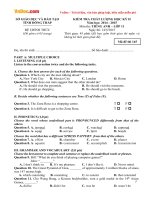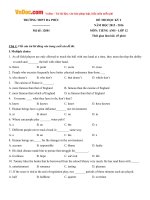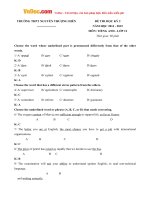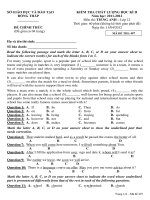20 de thi hoc ky 2 mon tieng anh lop 11 co dap an (2)
Bạn đang xem bản rút gọn của tài liệu. Xem và tải ngay bản đầy đủ của tài liệu tại đây (75.75 KB, 5 trang )
PRACTICE TEST 1
PART 1: Read the passage about tourism in Wales and circle the best option (A, B, C, or D) to fill in each
numbered blank. (1 point)
Barceloma, the second largest city in Spain, is one of the most (1)………….tourist destinations in Europe. It
is known for its sunshine, architecture, and lively streets. The City Council plans to transform Barcelona into a
smart city, by having technology reach every neighbourhood, balancing sustainable urban and economic
development and improving its inhabitants’ ………..(2). One of the great achievements is the transformation of the
200-hectare Poblenou industrial area into the 22@Barcelona District, also known as the innovation District. This is
considered the most important project of……………..(3) transformation in Barcelona in recent years, and one of
the most ambitious in Europe, with more than 200 million Euros invested in the infrastructure ……..(4). The project
was launched in 2000 and is still ongoing. As of December 2011, an estimated 4,500 new companies had moved to
the district since 2000, an average of 545 per year. The ……….(5) in 22@Barcelona has grown 22,8% from 73,464
inhabitants in 2001 to over 90,000.
1. A. ambitious
B. dangerous
C. popular
D. various
3. A. quantity of life B. quality of life
C. equality of life
D. skill of life
3. A. rural
B. urban
C. agricultural D. industrial
4. A. chance
B. opportunity C. currency
D. plan
5. A. popular
B. popularity
C. population
D. populace
PART 2: Read the passage about UNESCO and circle the correct option (A, B, C, or D) to answer each of the
given questions. (1 point)
In 1959, the government of Egypt was working on a plan to build a dam on the River Nile. It was called the
Aswan Dam, and it was intended to generate electricity and allow the river water to be used for agriculture. There
was one big problem with the plan, though. The dam would flood a nearby valley that contained ancient Egyptian
treasures, including two enormous stone temples.
It can be difficult for governments to choose culture and history over economics. However, if countries
always made decisions like this, the majority of the world's ancient sites would end up being destroyed. Luckily,
UNESCO stepped in. They formed a committee that tried to convince Egypt to protect its ancient treasures. With
support from many countries, they were finally successful. The huge temples were carefully removed from their
original site and moved to a safe location so that the dam could be built.
After their success in saving the temples in Egypt, UNESCO went on to save more sites around the world.
They protected lagoons in Venice, ruins in Pakistan, and temples in Indonesia. With industrialisation changing the
world rapidly, there were many sites that needed to be saved. Eventually, UNESCO formed the World Heritage
Organisation to protect important natural and historic sites wherever it was necessary.
By now, the World Heritage Organisation has protected hundreds of sites ranging from beautiful natural
islands to buildings in large cities and ancient ruins. If you're able to visit any of the many protected sites, you'll
agree it was worth it.
6. What is the best title for the passage?
A. UNESCO
B. UNESCO to succeed
C. UNESCO to develop
D. UNESCO to rescue
7. The word “this” in paragraph 2 refers to ____________.
A. culture
B. decision
C. country
D. economics
8. What is meant by the first sentence of the second paragraph?
A. Most governments prefer to sell their treasures.
B. Money sometimes seems more important than all other things.
C. Governments are never able to consider two things at once.
D. Governments usually don't know anything about their culture.
9. Why did UNESCO get involved in Egypt?
A. Egypt was planning to build a dam that would harm ancient temples.
B. Egypt was planning to build a valley for agriculture and electricity.
C. Egypt was planning to create a dam right on top of an ancient temple.
D. When the dam flooded a valley, several treasures were discovered.
10. Why is the World Heritage Organisation more important now than it would have been 200 years ago?
A. Countries didn't cooperate in the past.
B. Cities were smaller back then.
C. There were not as many interesting sites 200 years ago.
D. Modern business and production are changing the world.
PART 3. Vocabulary and grammar ( 1,5 point)
Circle the correct answer A, B, C or D to complete each of the following sentences (6 sentences) (1,5 points)
11. I believe the strong wind hasn’t done any serious damage to the roof, ________?
A. do I
C. has it
B. don’t I
D. hasn’t it
12. The reception, _________ carefully, was a great success.
A. have been prepared
C. having prepared
B. has been preparing
D. having been prepared
13. He denied _________ married.
A. having been
C. being
B. to have
D. having
14.There are many ways for us to reduce out …………….in order to save our environment.
A. deforestation
B. extinction
C. carbon footprint
D. diversity
15.Many species are threatened with ………..due to deforestation and loss of habitat.
A. emission
B. energy
C. catastrophe
D. extinction
16.Sulphur dioxide is one of several ………… that are released into the atmosphere by coal - fired power stations.
A. polluting
B. polluted
C. pollutants
D. pollution
PART 4: Complete the new sentence so that it means the same as the given one using NO MORE THAN FIVE
WORDS. (1 point)
17. The teacher said to Karen, "Please stand up."
->The teacher ………………………………………..
18. I'm sure you'll be amused by the latest Bond film.
-> I’m sure …………………………………. the latest Bond film amusing.
19.You had saved the lives of hundreds of wild animals. Thank you for that.
->Thank you …………………………… the lives of hundreds of wild animals
20.They had hunted and killed many wild animals. Later they regretted what they had done.
->They regretted ………………………………………. many wild animals
PRACTICE TEST 2
Choose word (A, B, C or D) with the underlined part pronounced differently
Câu 1:
A. shoulder
B. shock
C. splash
D. sharp
Câu 2:
A. spacious
B. advance
C. parcel
D. heart
Câu 3:
A. jumped
B. looked
C. needed
D. missed
Câu 4:
A. shops
B. watches
C. Smiths
D. states
Câu 5:
A. change
B. anger
C. language
D. hungry
Choose the best choice (a, b, c or d) to fill in the blank
Câu 6: Many people saw the guy……….hit her.
A. which
B. whose
C. whom
D. who
Câu 7: The last person ____ the room must turn off the light.
A. to leave
B. leaving
C. leaves
D. to left
Câu 8: We’d love to live in weightlessness. “Weightlessness” has the same meaning as……..
A. zero gravity
B. zero energy
C. zero water
D. no problem
Câu 9: No one knows the exactly…..he is living now.
A. the place it is where B. it is the place
C. the place which
D. the place where
Câu 10: The car does not look nice, ………..?
A. isn’t it
B. doesn’t it
C. is it
D. does it
Câu 11: It was very difficult, but we………persuade them to help us.
A. were not able to
B. were able to
C. could not
D. could
Câu 12: Let’s go swimming,…………?
A. will you
B. shall we
C. shan’t we
D. do we
Câu 13: This is the person...........they talked yesterday.
A. about whom
B. about that
C. who
D. whom
Câu 14: This is the novel ____ I’ve been expecting.
A. whom
B. whose
C. x (nothing)
D. who
Câu 15: The boy ____ by his parent was very sad.
A. be punished
B. punishing
C. to be punished
D. punished
Câu 16: You should not indulge yourself …………. anything that can form a bad habit.
A. for
B. on
C. in
D. at
Câu 17: Thank you for visiting when I was ill – it was very ……………… of you.
A. thoughtful
B. thought
C. thinking
D. thoughtless
Câu 18: It was on my birthday………… my mother gave me a bike.
A. what
B. when
C. that
D. which
Câu 19: The………is the air, water, and land in or on which people, animals and plants live.
A. consequence
B. planet
C. environment
D. resource
Câu 20: Solar energy is one of the ______ sources of energy.
A. alternative
B. replaced
C. changed
D. recycle
Read the passage below and choose the best answer from the four options marked A, B, C or D on the answer
sheet from 21 to 25
I’m interested in sports, especially athletics, and I run seven or eight kilometres every day. I particularly enjoy
cross country running, where you have to run across fields, jump over streams and so on. While I’m running I think
about all sorts of things, and at the end of a run I’m sometimes surprised to find that I’ve managed to solve a
problem that was on my mind.
Next year, I’m going to try the London Marathon. It’s a hard race 26 miles, or 42 kilometres-and you have to be
tough to finish, but I very much want to do it. I worry a bit about getting too old, and I’d like to prove to myself that
I’m still almost as fit as I was twenty years old.
I’m interested in mountaineering as well as running. I’ll never become an except climber, but I know what I’m
doing in the mountains. I successfully completed a course in snow and ice climbing when I was younger; and I’ve
done a series of easy climbs in the Alps during the last few years. My wife doesn’t share my interest in mountains.
She agreed to go climbing with me once, but she found that she felt ill as soon as she got above 1,000 metres.
Câu 21: If you do cross country running, you must ____.
A. cross your countryside
B. cross your country
C. run along the coast
D. cross fields, stream, etc …
Câu 22: At the end of a run the writer sometimes finds that ____.
A. he grows bigger
B. he is able to get the answer to a problem
C. he feels better
D. he gets a surprising problem
Câu 23: The writer wants to take part in the London Marathon because ____.
A. he wants to do it before getting old
B. it helps him solve his problems
C. it helps to keep him fit
D. the reward is great
Câu 24: The writer takes up mountaineering because ____.
A. he wants to become an expert climber
B. his wife is interested in it
C. it is easy to practice
D. he simply likes it
Câu 25: The word “it” in paragraph 2 refers to……….
A. the writer
B. the London Marathon
C. the wife
D. The length
Choose the underlined words/ phrases which need correcting
Câu 26: The song to that we listened last night was beautiful.
A
B
C
D
Câu 27: It is my closest friend goes abroad to study next month.
A
B
C
D
Câu 28:It was my uncle who teaches me how to play the drum.
A
B
C
D
Câu 29: It was at this shop where I bought a T-shirt three days ago.
A
B
C
D
Câu 30: Before Gagarin’s historic flight, no one knew precise what
A
B
would happen to a human being in space.
C
D
Choose the best answer to fill in the blank in the following passage from 31 to 35
Natural resources are grouped into two categories, renewable and nonrenewable. A ....(31)...... resource is one
that may be replaced over time by natural processes, such as fish or vegetables, or is inexhaustible, such as .....
(32)...... energy. The goal of renewable resource conservation is to ensure that such resources are not consumed …
(33)….than they are replaced. Nonrenewable resources are those in limited supply ….(34)….. cannot be replaced or
can be replaced only over extremely long periods of time. Nonrenewable resources include fossil fuels and mineral
deposits, such as iron ore and gold ore. Conservation activities for nonrenewable resources focus .....(35).....
maintaining an adequate supply of these resources well into the future.
Câu 31: A. renewable
B. new
C. modern
D. nonrenewable
Câu 32: A. earthly
B. polar
C. lunar
D. solar
Câu 33: A. faster
B. more fast
C. more faster
D. fastest
Câu 34: A. when
B. what
C. who
D. that
Câu 35: A. in
B. at
C. by
D. on
Choose one rewritten sentence as being instructed
Câu 36: Len 's bicycle was broken. She had to take a bus.
A. Len, who broke down her bicycle had to take a bus.
B. Len's bicycle, which was broken, had to take a bus.
C. Len who had to take a bus, broke her bicycle.
D. Len, whose bicycle was broken, had to take a bus.
Câu 37: The man gave her the book last week. Which of the following is subject focus?
A. It was last week that the man gave her the book.
B. It was the man who gave her the book last week.
C. It was the book that the man gave her last week.
D. It was the book that was given to her last week.
Câu 38: I did not realize his real problem. Which of the following is object focus?
A. It was I who did not realized his problem
B. It was his real problem which I realized him.
C. It was not his real problem that I realized him,
D. It was his real problem that I did not realize.
Câu 39: James likes ice-cream. I often have small talks with her.
A. James, I often have small talks with, likes ice-cream
B. James, with whom I often have small talks, likes ice-cream
C. James, with who I often have small talks, likes ice-cream
D. James, with her I often have small talks, likes ice-cream
Câu 40: He is the only person who owns a villa in this area.
A. He is the only person owns a villa in this area.
B. He is the only person owning a villa in this area.
C. He is the only person to be owning a villa in this area.
D. He is the only person to own a villa in this area.









